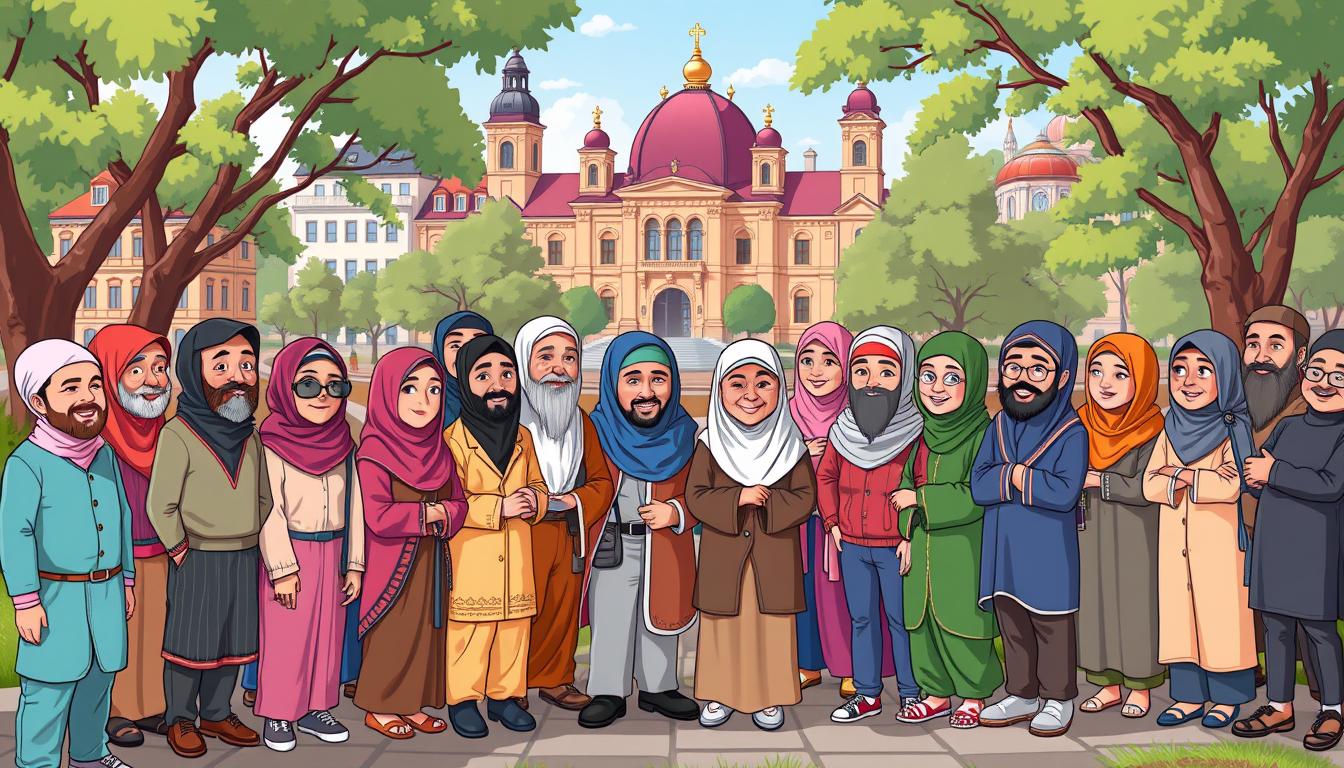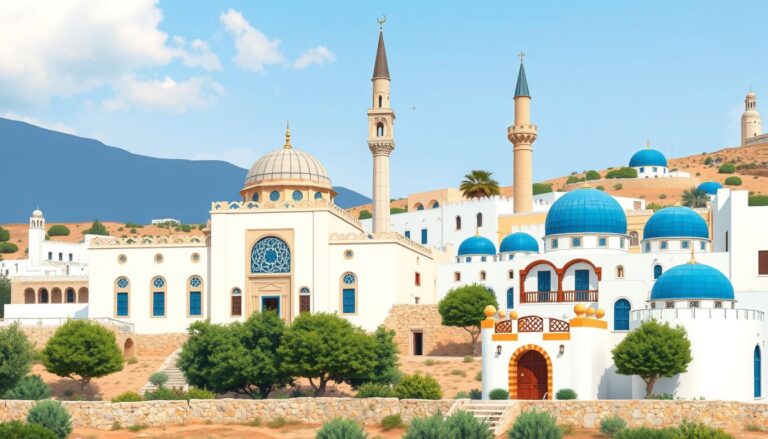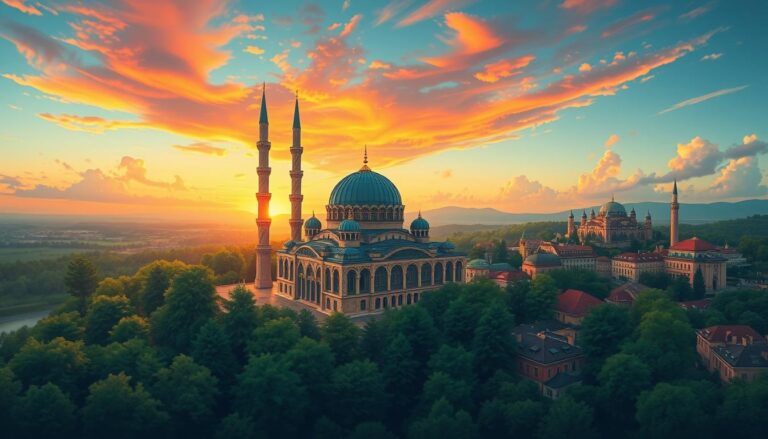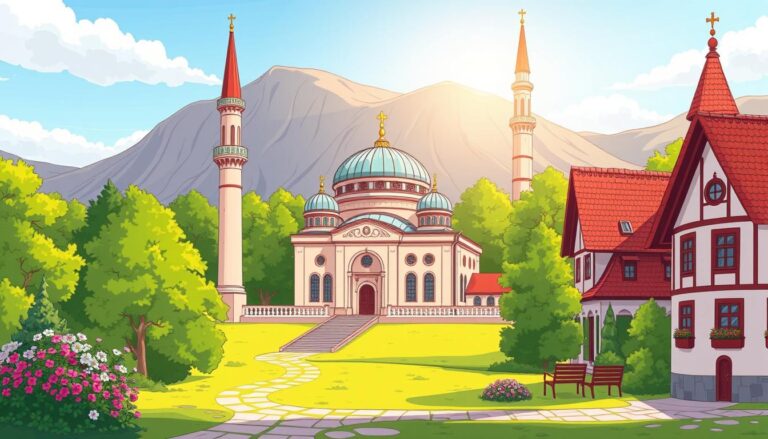Islam in Slovakia
In the heart of Central Europe, the small country of Slovakia is home to a unique religious tapestry, where the presence of Islam, though relatively modest, has been steadily growing. According to the 2021 census, 3,862 individuals in Slovakia self-identified as Muslim, a figure that representatives of the Muslim community estimate to be closer to 6,000. This religious minority, accounting for less than 0.1% of the country’s total population of 5.4 million, is shaping the nation’s cultural and social landscape in profound ways.
Key Takeaways
- Slovakia has a small but growing Muslim population, with an estimated 6,000 Muslims in the country as of 2021.
- The country currently has seven mosques, with the Cordoba Culture Center in Bratislava being the only place of Muslim worship under an Islamic foundation.
- Islam in Slovakia has faced challenges, including negative attitudes from some politicians and the public, as well as restrictive registration requirements for religious communities.
- Despite these obstacles, the Muslim community in Slovakia continues to contribute to the country’s religious and cultural diversity.
- Efforts to promote interfaith dialogue and religious freedom have been ongoing, though more work is still needed to ensure the full integration of Muslims in Slovakian society.
Overview of Islam in Slovakia
The Muslim population in Slovakia is relatively small, comprising less than 0.1% of the country’s total population. According to the 2021 census, around 3,900 individuals identified as Muslims, a significant increase from the estimated 2,000 Muslims in 2011. However, the Muslim community itself estimates their numbers to be closer to 6,000.
The Muslim population in Slovakia is diverse, consisting mainly of refugees from former Yugoslavia (such as Bosnians and Albanians), workers from modern Turkey (including Turks and Kurds), and a small number of Arab students. Since the end of Communism in 1990 and Slovakia’s independence in 1993, approximately 150 Slovaks have converted to Islam.
Muslim Population and Demographics
Slovakia’s total population is estimated at 5.4 million (midyear 2022), with Roman Catholics making up 55.8% of the population, down from 62% in the previous census in 2011. The Evangelical Church of the Augsburg Confession members constitute 5.3% of the population, and Greek Catholics represent 4% of the population.
In the 2021 census, approximately 3,900 individuals identified as Muslims, which doubled from 2011 estimates. However, the Muslim community in Slovakia estimates their number to be around 6,000. The census also reported 2,000 Jews, contrasting with the Central Union of Jewish Religious Communities in the Slovak Republic’s estimate of 5,000 Jews.
Slovakia currently has four mosques within its territory, with the majority of Muslims residing in the capital city of Bratislava. Smaller Muslim communities also exist in Košice and Martin.
History of Islam in Slovakia
The history of Islam in Slovakia can be traced back to the Ottoman rule over parts of the region. Decades after the Hungarian defeat at Mohács in 1526, Turkish troops controlled Štúrovo (Párkány) and other parts of today’s southern central Slovakia, encouraging Protestant Christian groups while Habsburg Austrian troops occupied and recatholized the northern and western parts.
Later, the Turks seized some further territories in southern central Slovakia and pillaged in territories up to Nitra. However, when the Turks lost the Battle of Vienna and the Ottoman vassal Emeric Thököly was defeated in Slovakia, between 1687 and 1699, Turkish Ottoman rule in Hungary was finally broken.
Ottoman Rule and Influence
The Ottoman influence in Slovakia during this period was significant, as the Turks encouraged the growth of Protestant Christian groups in the areas under their control. This contrasted with the efforts of the Habsburg Austrians to recatholize the northern and western parts of the region.
Despite the eventual defeat of the Ottomans, the history of Islam in Slovakia left a lasting impact on the country’s religious landscape, with the presence of Protestant Christian communities in the former Ottoman-controlled areas.
“The Turks seized some further territories in southern central Slovakia and pillaged in territories up to Nitra.”
The history of Islam in Slovakia is a complex and multifaceted topic, shaped by the country’s interactions with the Ottoman Empire during this pivotal period.
Legal Status and Registration Requirements
In 2016, Slovakia passed legislation that effectively blocked Islam from gaining official status as a religion in the country. The law required religious denominations to have at least 50,000 adherents to be granted state rights, a threshold that the nation’s Muslim population of around 5,000 people could not meet.
This registration requirement has been a point of contention, with the Public Defender of Rights (ombudsperson) stating in 2022 that the criteria were unreasonable, discriminatory, and unnecessary. However, the Ministry of Culture has remained adamant, refusing to initiate any legal changes to the process.
Unregistered religious groups in Slovakia lack legal status, limiting their ability to establish religious schools or receive government funding. Clergy from these groups also do not have the right to minister to members in prisons or government hospitals, and their civil functions are not recognized by the state, requiring additional bureaucratic steps.
The registration process has been a significant hurdle for the Muslim community in Slovakia, as they have not presented any reported problems that would prevent them from meeting the stringent requirements. With an estimated 6,000 Muslims in the country, the lack of official recognition has hindered their ability to fully practice their faith and engage with the broader community.
“The registration requirements are unreasonable, discriminatory, and unnecessary,” stated the Public Defender of Rights in 2022, highlighting the need for a more inclusive and equitable approach to religious recognition in Slovakia.
As the country grapples with the complexities of religious diversity and registration, the legal status of Islam and the challenges faced by the Muslim community continue to be a topic of ongoing debate and scrutiny.
Anti-Muslim Sentiments and Discrimination
In Slovakia, the Muslim community has continued to report instances of anti-Muslim hate speech on social media, which they largely attribute to public statements made by politicians. These statements often portray Muslim refugees as a threat to the country’s society. According to a survey conducted by a local non-governmental organization (NGO), a majority of Slovaks hold negative attitudes toward Muslim refugees and migrants, with 43% believing that Islam should be banned in the country.
The government officials and members of parliament (MPs) from both the governing coalition and opposition parties have been reported making anti-Muslim statements. This rhetoric serves to fuel Anti-Muslim sentiments in Slovakia and discrimination against Muslims in Slovakia, contributing to an environment of Islamophobia in Slovakia.
Government and Political Rhetoric
The survey findings suggest that a significant portion of the Slovak population views Islam as a “very dangerous” religion, and this sentiment is further amplified by the rhetoric from government and political leaders. This rhetoric not only reflects but also perpetuates Anti-Muslim sentiments in Slovakia, contributing to an atmosphere of discrimination against Muslims in Slovakia and Islamophobia in Slovakia.
“The Muslim community continued to report anti-Muslim hate speech on social media, which it mostly attributed to public statements by politicians portraying Muslim refugees as a threat to the country’s society.”
The persistent Anti-Muslim sentiments in Slovakia and discrimination against Muslims in Slovakia are deeply concerning, as they create an environment of Islamophobia in Slovakia that can have far-reaching consequences for the Muslim community and social cohesion within the country.
Islam in Slovakia
In the 2021 census, 3,862 individuals self-identified as Muslim in Slovakia, though representatives of the Muslim community estimated their number at around 6,000. Despite the small Muslim population, which accounts for only 0.4% of the country’s total, the presence of Islam in Slovakia is marked by a complex history and ongoing challenges.
Slovakia currently has seven mosques within its territory, with the Cordoba Culture Center (Kultúrne Centrum Culture Center Córdoba) in Bratislava serving as the only place of Muslim worship under an Islamic foundation. However, this mosque is not open for Fajr prayer and does not have an official mosque permit, reflecting the legal restrictions and administrative hurdles faced by the Muslim communities in Slovakia.
The Muslim population in Slovakia has faced various challenges, including the introduction of a 2017 law amendment that raised the minimum required number of adherents for a religion to be officially recognized from 20,000 to 50,000. This effectively hindered the ability of the Muslim community, which was estimated at around 5,000 people in 2016, to gain official recognition and access to public funding or resources.
Furthermore, the Slovak media has been criticized for widely associating Islam with terrorism, contributing to the negative stereotypes and discrimination experienced by the Muslim communities in Slovakia. This sentiment, mirroring the broader trend across Europe, has led to an increase in hate crimes against Muslims in the country.
“The Amendment Bill called ‘Act No. 308/1991 – Freedom of Religious Faith and on the Position of Churches and Religious Societies,’ introduced by the Slovak National Party (SNS) in 2016 required a minimum of 50,000 adherents for a religion to be eligible for public subsidies, official religious group status, and to operate their schools, up from the previous threshold of 20,000 adherents.”
Despite these challenges, the Islam in Slovakia continues to strive for greater acceptance and integration within the country’s social and political landscape. The efforts to promote religious freedom and interfaith dialogue, as well as the preservation of historical artifacts and manuscripts, serve as important markers of the ongoing journey of the Muslim communities in Slovakia.
Cultural Integration and Challenges
The Muslim community in Slovakia has faced a complex landscape when it comes to cultural integration and public attitudes. According to a survey by a local non-governmental organization (NGO), a majority of Slovaks held negative views towards Muslim refugees and migrants, with 43 percent believing Islam should be banned in the country. This sentiment has been fueled, in part, by public statements from politicians portraying Muslim refugees as a threat to the country’s society.
The Muslim community in Slovakia, which is estimated to be around 5,000 strong, has reported instances of anti-Muslim hate speech on social media. This has been a significant challenge for the community, as it works to navigate the complex dynamics of integration and public perception. The local Muslim population, which is primarily composed of students and entrepreneurs, faces an uphill battle in fostering greater understanding and acceptance within Slovak society.
Public Perception and Attitudes
The public’s perception of Muslims in Slovakia has been shaped by a range of factors, including the rise of far-right political parties, the spread of misinformation and “post-truth” politics, and the media’s portrayal of Muslim extremist actions. This has contributed to a general climate of fear and mistrust towards the Muslim community, with some Slovaks viewing Islam as a “very dangerous” religion.
- Approximately 5,000 Muslims are living in Slovakia, with around 150 known Slovak converts to Islam.
- The local Muslim community consists mainly of students and entrepreneurs, in contrast to Western European countries that have more workers in their Muslim communities.
- An Islamic cultural and educational center in Bratislava has faced construction challenges, highlighting the difficulties the community faces in establishing its presence.
- Media reporting on Muslims in Slovakia is often biased, one-sided, and subjective, according to the Islamic Foundation head.
As Slovakia continues to grapple with the complexities of Muslim integration, it will be crucial for the government, civil society, and the media to work towards fostering greater understanding, tolerance, and acceptance within the country.
Islamic Centers and Places of Worship
Slovakia, a country with a predominantly Christian population, has a small but growing Muslim community. According to the 2021 census, around 3,900 individuals identified as Muslim, more than double the number reported in 2011. However, community representatives estimate the actual Muslim population to be around 6,000, reflecting the diversity and growth of Islam in the country.
The Cordoba Culture Center (Kultúrne Centrum Culture Center Córdoba) in Bratislava is the only place of Muslim worship in Slovakia under an Islamic foundation. The center houses a musalla or prayer room, but it is not officially considered a mosque as it is not open for Fajr (dawn) prayer. Currently, Slovakia hosts seven mosques within its territory, with the Cordoba Culture Center serving as the primary hub for the Muslim community.
The Friday sermon at the Cordoba Culture Center is delivered in Arabic, English, and Slovak, starting at 1:00 pm. The center has attempted to obtain an official mosque permit from the government, but their proposal has been rejected due to legal challenges surrounding the recognition of Islam in the country.
The Slovakian government has faced criticism for its resistance to recognizing Muslim communities and allowing the construction of mosques. In 2016, the Slovak National Party presented a bill requiring a religion to have at least 50,000 followers to be recognized as an official religion, effectively hindering the legal status of Islam in the country.
Despite these challenges, the Muslim community in Slovakia continues to navigate the complexities of establishing its Islamic infrastructure and mosques and prayer halls within the country’s legal and social landscape.
“The Muslim community in Slovakia has faced significant challenges in establishing its presence and infrastructure, but they remain resilient in their efforts to build a stronger religious and cultural identity.”
Efforts to Promote Religious Freedom
Slovakia has taken steps to protect religious freedom and support minority faiths within its borders. The government has created the position of Plenipotentiary for Freedom of Religion or Belief, tasked with promoting religious freedom both domestically and internationally. This official works to address the concerns of religious minorities and ensure they can freely practice their beliefs.
The U.S. Embassy in Slovakia has also engaged with the government on issues related to religious freedom. U.S. Ambassador and other embassy officers have raised the treatment of religious minorities, including the difficulties they face with registration, as well as measures to counter what religious groups and others describe as widespread antisemitism and Islamophobia.
“The government’s efforts to promote religious freedom and protect minority faiths are a positive step in ensuring all Slovaks can practice their beliefs without fear of discrimination or persecution.”
While challenges remain, Slovakia’s commitment to Religious freedom in Slovakia and Protecting minority religions in Slovakia demonstrates its recognition of the importance of safeguarding the rights of all its citizens, regardless of their religious affiliation.
One key example of this is the government’s annual subsidies to registered religious groups, which have seen a 10% increase in 2023. This financial support helps ensure these organizations can continue their activities and serve their communities. Additionally, the government’s efforts to address hate speech and extremism targeting religious minorities are crucial in fostering a more inclusive and tolerant society.
Overall, Slovakia’s focus on Religious freedom in Slovakia and Protecting minority religions in Slovakia represents an important step in safeguarding the rights and freedoms of all its citizens, regardless of their faith. While challenges remain, the country’s commitment to these principles is a positive sign for the future.
Historical Artifacts and Manuscripts
The Islamic heritage in Slovakia is preserved in the University Library of Bratislava, which houses a remarkable collection of Islamic manuscripts. These historical artifacts showcase the presence and influence of Islam in the country’s cultural landscape.
One of the notable manuscripts in the collection is “An Essay on Statements in Logic” by Safvet beg Bašagić, a renowned Bosnian scholar and diplomat. Additionally, the library preserves a treatise on astronomy, surveying, and mathematics by Badruddin al-Maridini, as well as a copy of the renowned works of Saadi Shirazi, a celebrated Persian poet and philosopher.
These manuscripts not only illuminate the intellectual and cultural contributions of Islamic scholars but also highlight the rich Islamic heritage in Slovakia. The presence of these rare and valuable artifacts underscores the significant role Islamic manuscripts in Slovakia have played in shaping the country’s cultural and historical landscape.
“These historical artifacts and manuscripts showcase the presence and influence of Islam in Slovakia’s cultural heritage.”
Interfaith Dialogue and Initiatives
In Slovakia, efforts to promote religious tolerance and interfaith cooperation have gained momentum in recent years. The U.S. Embassy has been actively supporting initiatives aimed at combating anti-Islamic sentiment and antisemitism through public diplomacy grants. The U.S. Ambassador and other embassy officers have regularly met with registered and unregistered religious organizations and NGOs to address the issue of hate speech and highlight the role of churches and religious groups in countering extremism and fostering tolerance.
One notable initiative was a speaking tour around 14 Slovak high schools, featuring a rabbi, priest, and imam engaging with both students and teachers. This program generated significant youth participation, with record interest from students in Bratislava and other cities. The interfaith discussions were effective in dispelling common myths about Judaism, Christianity, and Islam, as evidenced by questionnaire results and shifts in public perception.
- 660 high school students and dozens of teachers were engaged in discussions to address prevalent prejudices, including stereotypes about Jews, Muslims, and Christians.
- Questionnaire results indicated that after the discussions, prejudices fluctuated around an average value of 3, reflecting a positive shift in attitudes.
- The interreligious dialogue events engaged students through unique approaches, such as sharing meals and exchanging cultural items, fostering understanding and cooperation.
The participants in the interfaith dialogues included a Jewish rabbi, Muslim imam, and Evangelical theologian, showcasing the diversity within monotheistic religions. These discussions were conducted in various cities across Slovakia to reach a wider audience and engage with different communities. Collaboration with organizations like the Islamic Foundation and Jewish Youth further enhanced the effectiveness and reach of these interfaith cooperation in Slovakia initiatives.
The media coverage of these interfaith events contributed to increasing awareness and promoting dialogue between different religious communities in Slovakia, promoting religious tolerance in Slovakia. As the country continues to navigate the complexities of religious diversity, these efforts have played a crucial role in fostering mutual understanding and interfaith cooperation.
Conclusion
The presence of Islam in Slovakia has a long and complex history, tracing back to the country’s incorporation into the Ottoman Empire. While the Muslim community in Slovakia is relatively small, comprising less than 0.1% of the population, they have faced challenges in terms of legal recognition, anti-Muslim sentiments, and integration into Slovakian society.
Despite these obstacles, the Muslim community in Slovakia has remained well-integrated, financially self-supporting, and largely trouble-free. They have made positive contributions to the country, with their Friday prayers even conducted in the Slovak language, a rarity in some Western European nations. The Islamic Foundation in Slovakia has been a vocal advocate for their community, criticizing the Prime Minister’s statements as harmful to Slovak Muslims and the country’s international reputation.
Efforts are underway to promote religious freedom and interfaith dialogue in Slovakia, ensuring that the country’s religious diversity is respected and celebrated. Additionally, Slovakia’s rich Islamic heritage is preserved through historical artifacts and manuscripts housed in the country’s libraries, providing a glimpse into the region’s past and the enduring presence of Islam in the region.
Source Links
- Islam in Slovakia
- Slovakia – United States Department of State
- Microsoft Word – Input for HRC46 Report – Islamic Foundation in Slovakia.docx
- Once Again, Slovakia Makes Life Harder for Muslims
- Slovakia – United States Department of State
- Islam in SLOVAKIA
- Religion in Slovakia
- Slovakia – United States Department of State
- Slovakia’s New Religious Registration Law is a Step in the Wrong Direction – Providence
- Islamophobia – European Network Against Racism
- Slovakia’s deplorable move to criminalise Islam
- Slovakia didn’t recently pass law to ban Islam from gaining official status as a religion | Logically Facts
- Muslims in Slovakia work for positive integration
- Islamophobia in Eastern Europe: Slovakia and the Politics of Hate
- » Muslims in Slovakia Remain Marginalised by Discriminatory Laws
- Freedom of religion in Slovakia
- USDOS – US Department of State (Autor): „2020 Report on International Religious Freedom: Slovakia“, Dokument #2051703
- MA History of Art and Architecture of Islamic Middle East
- Beyond Timbuktu — Harvard University Press
- No title found
- Mário Nicolini Shares Encouraging Interfaith News
- Explaining Interfaith Dialogue in the Muslim World | Politics and Religion | Cambridge Core
- PM Fico: Islam has no place in Slovakia
- A Reflection on Religion and Churches in Slovakia 30 Years After the Fall of Communism







